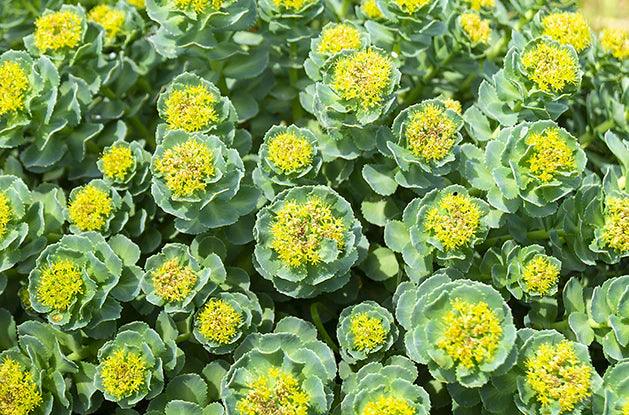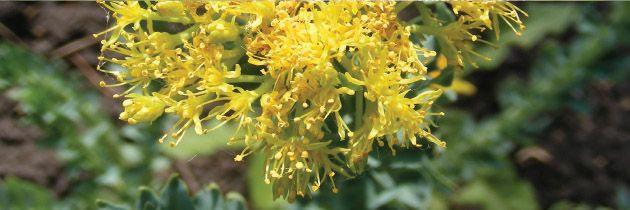QUICK FACTS
Scientific name: Rhodiola rosea
Other names: Golden root, rose root, rosenroot, arctic root, orpin rose, stonecrop
Location: Mostly grows in subarctic, high-altitude areas of Europe and Asia, although it has also been found in the Appalachian mountains of the United States
Known for: Improving energy, strength, and endurance
Part Used: Root
Fun fact: There have been suggestions that Vikings used rhodiola to enhance their physical strength and endurance.1
Good for: Energy and physical performance, stress support, immune health, nervous system support, cardiovascular and heart health
Key Properties & Actions: Adaptogen, antidepressant, anxiolytic, immunomodulator, cardioprotective, neuroprotective, antimicrobial, antioxidant
What is Rhodiola?
Rhodiola rosea, commonly referred to as rhodiola, is a flowering perennial that grows in some of the harshest environments on earth. Able to adapt and flourish in the toughest of conditions, rhodiola can be found growing in the subarctic and high-altitude regions of Europe, Asia, and North America.
Frequently seen inhabiting the crevices of mountain rocks and sea cliffs, rhodiola generally reaches a height of 12 to 30 inches and produces many small yellow flowers. Rhodiola possesses a sturdy stem and succulent leaves, while the root, which is used as medicine, has a rose-like scent when cut, hence the Latin name rosea.
 Rhodiola contains many biologically active compounds that contribute to its medicinal value, most notably salidroside and rosavins. Although other rhodiola species contain salidroside, the beneficial rosavins have only been found in the Rhodiola rosea species.1
Rhodiola contains many biologically active compounds that contribute to its medicinal value, most notably salidroside and rosavins. Although other rhodiola species contain salidroside, the beneficial rosavins have only been found in the Rhodiola rosea species.1
Rhodiola has thousands of years of traditional medicinal use across Asia and Europe and a substantial amount of modern research to back up its benefits. Today, the root is primarily used for its adaptogenic, energy-enhancing, immune-supportive, and cardiovascular-supportive qualities.
Benefits of Rhodiola and How It Works
Stress Support
In 1961, G.V. Krylov, a Russian botanist and taxonomist, found that rhodiola root contained powerful adaptogenic compounds.1 These compounds increase the body’s resistance to stress, exhaustion, and fatigue. Various in vitro and in vivo studies suggest rhodiola does this by normalizing the release of stress hormones like cortisol.2
A double-blind, randomized, and placebo-controlled study investigated the adaptogenic effects of rhodiola on foreign students during a stressful examination period. For 20 days, they were given 50 mg of rhodiola extract twice daily. Although the researchers noted the dosage was probably suboptimal, students experienced significant improvement in mental fatigue and general well-being at the end of the 20-day period.3
A 2016 review suggested that rhodiola may help improve mild stress-induced depression, most likely due to its role in regulating the cellular response to stress, including in the neuroendocrine, neurotransmitter receptor, and molecular networks.4
Energy and Endurance
Rhodiola has long been used to increase energy and endurance, becoming a favorite among Russian athletes and workers during the 20th century.
Modern research has confirmed this historical usage with multiple studies on both normal individuals and Olympic-level athletes showing increased physical work capacity and shortened recovery time between bouts of high-intensity exercise.
In a double-blind, placebo-controlled study, 200 mg of rhodiola extract before exercise improved endurance capacity in young, healthy volunteers, increasing time to exhaustion by 24 seconds on average.5 Although the underlying mechanisms that contributed to better endurance are not fully understood, one idea is that the compounds in rhodiola stimulate endorphin activity, allowing an individual to tolerate the pain and discomfort that can come with exhaustive exercise.
In a placebo-controlled study, master-level competitive skiers were given rhodiola extract or placebo 30 to 60 minutes before a race. Athletes given the rhodiola extract had better performance and improved recovery time compared to placebo.1
Unlike central nervous system stimulants like caffeine, rhodiola’s beneficial effects do not diminish over time.
 Immune Health
Immune Health
In vitro and animal studies as well as a few clinical trials have all indicated that rhodiola is able to modulate the immune response. This means it can calm overactive portions of the immune system associated with damaging inflammation while, at the same time, boosting the immune system’s ability to fight infections.6
Some in vitro and in vivo studies have suggested that rhodiola extract has anti-tumor activity. For example, a 2016 in vitro study found salidroside, a compound extracted from rhodiola, was able to fight human colorectal cancer cells by inducing apoptosis (programmed cell death) and autophagy (cellular recycling and regeneration). Although research hasn’t been conducted in humans, these studies suggest rhodiola may have potential value as an adjunct to cancer treatment.7
Cardiovascular and Heart Health
Rhodiola supports the cardiovascular system from many different angles. In vitro and in vivo studies have shown rhodiola to be capable of protecting heart muscle cells, mitochondria, and vascular endothelial cells, while other research suggests it may increase oxygen delivery to the heart.8
Furthermore, its adaptogenic and antioxidant properties can reduce and protect the cardiovascular system from stress-induced harm like irregular heartbeats.1,13
History & Traditional Use
Rhodiola has been in use for thousands of years, its medicinal attributes having first been documented in Siberia, China, and Tibet.
Historically, this herb has been highly coveted, used to enhance physical performance, promote longevity, and provide resistance to high altitude sickness. Siberians would secretly transport rhodiola down ancient trails to trade for Georgian wines, fruits, garlic, and honey. In China, emperors sent expeditions to Siberia to bring back the powerful root.1
 However, rhodiola’s influence was not confined to Asia, The herb appeared in De Materia Medica, a medical book written by the Greek physician Dioscorides in 77 AD. In the 18th century, Carl Linnaeus, a Swedish botanist and the “father of taxonomy,” renamed the herb Rhodiola rosea, using it for various conditions such as hernias and headaches. By 1755, rhodiola was a part of the first Swedish Pharmacopeia.1
However, rhodiola’s influence was not confined to Asia, The herb appeared in De Materia Medica, a medical book written by the Greek physician Dioscorides in 77 AD. In the 18th century, Carl Linnaeus, a Swedish botanist and the “father of taxonomy,” renamed the herb Rhodiola rosea, using it for various conditions such as hernias and headaches. By 1755, rhodiola was a part of the first Swedish Pharmacopeia.1
In Russia, rhodiola was first recommended in 1969 for use against fatigue. Today, it is the most popular adaptogen utilized in Russia and has been studied extensively.9
How to Use and Dosing
Rhodiola is typically consumed as a tincture or powdered extract.
General dosing ranges for a tincture are 1-3 mL, two to four times daily.
When taking powdered rhodiola, it is best to look for an extract that has been standardized to about 3% rosavins and 1% salidroside, as this mimics the naturally-occurring ratio of these compounds found in the plant. Usually, 200-400 mg is taken one to three times daily.
For stress support, rhodiola works well with other adaptogens like shilajit, reishi mushroom, ashwagandha, and holy basil.
To reduce mental fatigue and support the brain, rhodiola can be combined with lion’s mane, bacopa, and ginkgo biloba.
Interactions
There are no known significant interactions with drugs. Limited animal studies suggest that rhodiola may affect antihypertensives such as losartan and blood thinners such as warfarin, so be aware if taking these drugs.
Always check with your health care practitioner before use if you are taking medications. For more general education on potential interactions between herbs and medications, check out Dr. Bill Rawls’ article: Is it Safe to Take Herbs with My Medications?
Precautions & Side effects
While rhodiola is generally well tolerated, it can be mildly stimulating for some people; therefore, avoid taking rhodiola late in the day to prevent potential interference with sleep. Some sources suggest avoiding using rhodiola in people with bipolar, hypomania, or paranoia.
Disclaimer: This information is intended only as general education and should not be substituted for professional medical advice. Any mentioned general dosage options, safety notices, or possible interactions with prescription drugs are for educational purposes only and must be considered in the context of each individual’s health situation and the quality and potency of the product being used. Use this information only as a reference in conjunction with the guidance of a qualified healthcare practitioner.
Want to See the Science? Check Out Our References Below.
1. Brown R, Gerbarg P, Ramazanov Z. Rhodiola rosea: a phytomedicinal overview. HerbalGram. 2002; 56:40-52.
2. Anghelescu IG, Edwards D, Seifritz E, Kasper S. Stress management and the role of Rhodiola rosea: a review. Int J Psychiatry Clin Pract. 2018;22(4):242-252. doi:10.1080/13651501.2017.1417442
3. Spasov AA, Wikman GK, Mandrikov VB, Mironova IA, Neumoin VV. A double-blind, placebo-controlled pilot study of the stimulating and adaptogenic effect of Rhodiola rosea SHR-5 extract on the fatigue of students caused by stress during an examination period with a repeated low-dose regimen. Phytomedicine. 2000;7(2):85-89. doi:10.1016/S0944-7113(00)80078-1
4. Amsterdam JD, Panossian AG. Rhodiola rosea L. as a putative botanical antidepressant. Phytomedicine. 2016;23(7):770-783. doi:10.1016/j.phymed.2016.02.009
5. De Bock K, Eijnde BO, Ramaekers M, Hespel P. Acute Rhodiola rosea intake can improve endurance exercise performance. Int J Sport Nutr Exerc Metab. 2004;14(3):298-307. doi:10.1123/ijsnem.14.3.298
6. Recio MC, Giner RM, Máñez S. Immunmodulatory and Antiproliferative Properties of Rhodiola Species. Planta Med. 2016;82(11-12):952-960. doi:10.1055/s-0042-107254
7. Fan XJ, Wang Y, Wang L, Zhu M. Salidroside induces apoptosis and autophagy in human colorectal cancer cells through inhibition of PI3K/Akt/mTOR pathway. Oncol Rep. 2016;36(6):3559-3567. doi:10.3892/or.2016.5138
8. Chen Y, Tang M, Yuan S, et al. Rhodiola rosea: A Therapeutic Candidate on Cardiovascular Diseases. Oxid Med Cell Longev. 2022;2022:1348795. Published 2022 Feb 27. doi:10.1155/2022/134879
9. Panossian A, Wikman G, Sarris J. Rosenroot (Rhodiola rosea): traditional use, chemical composition, pharmacology and clinical efficacy. Phytomedicine. 2010;17(7):481-493. doi:10.1016/j.phymed.2010.02.002
10. Konstantinos F, Heun R. The effects of Rhodiola Rosea supplementation on depression, anxiety and mood – A Systematic Review. Global Psychiatry. 2020;3(1):72-82. doi:10.2478/gp-2019-0022
11. Ishaque S, Shamseer L, Bukutu C, Vohra S. Rhodiola rosea for physical and mental fatigue: a systematic review. BMC Complement Altern Med. 2012;12:70. Published 2012 May 29. doi:10.1186/1472-6882-12-70
12. Lu Y, Deng B, Xu L, Liu H, Song Y, Lin F. Effects of Rhodiola Rosea Supplementation on Exercise and Sport: A Systematic Review. Front Nutr. 2022;9:856287. Published 2022 Apr 7. doi:10.3389/fnut.2022.856287
13. Maĭmeskulova LA, Maslov LN, Lishmanov IuB, Krasnov EA. Ob uchastii mu-, del’ta- i kappa-opioidnykh retseptorov v realizatsii antiaritmicheskogo éffekta rodioly rozovoĭ [The participation of the mu-, delta- and kappa-opioid receptors in the realization of the anti-arrhythmia effect of Rhodiola rosea]. Eksp Klin Farmakol. 1997;60(1):38-39.




